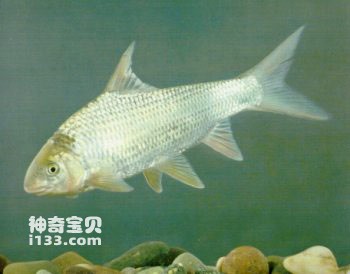Onychostoma sima belongs to the order Cypriniformes, family Cyprinidae, subfamily Onychostoma sima, and genus Onychostoma sima. Commonly known as: Bai Jia, Claw Liuzi.
The body is spindle-shaped, with flat sides, a raised back in front of the dorsal fin, a round abdomen, and a slender caudal peduncle. The head is short and broad, the muzzle is blunt and protruding, and there is an obvious oblique groove at the boundary of the preorbital bones toward the corners of the mouth. Suboral position; mandible with sharp horny front edge. The postlabial groove is limited to the corner of the mouth; the barbels are degenerated, and only juvenile fish with a total length of less than 10 cm have 2 pairs of barbels or 1 pair of barbels. The outer edge of the dorsal fin is slightly concave, with a thick hard spine with a serrated trailing edge and a soft tip; the caudal fin is deeply forked. The scales are medium-large, and the scales on the chest and abdomen are smaller. There are scale sheaths at the base of the dorsal and anal fins, and narrow axillary scales at the base of the pelvic fin. The back is blue-black, the abdomen is gray-white, and the scales above the lateral line have obvious gray-black edges; the dorsal fin and caudal fin are gray-black, and the other fins are gray-white.

White turtles mostly inhabit river sections with fast currents and gravelly bottoms, and like to swim at the bottom of the water. Every year, they go upstream in groups around the Rain Festival and down the river before and after the Beginning of Autumn. In winter, they spend the winter in piles of rocks in the deep water of the main stream of the river. It often uses its sharp horny mandibles to scoop up algae on rocks, and also eats a small amount of chironomid larvae, oligochaetes and fragments of higher plants. The highest feeding intensity is in March-April, and feeding is generally less or stopped during winter and reproductive seasons. They reach sexual maturity in the third winter, and the spawning period is longer, ranging from April to June in the Yangtze River Basin and from February to March in the Pearl River Basin. The spawning grounds are mostly rapids on gravel and beaches, and the eggs are hatched on the gravel at the bottom of the water.
The white turtle is distributed in the main and tributaries of the middle and upper reaches of the Yangtze River and the Pearl River and Yuanjiang water systems.
The white turtle is one of the main economic fish in the upper reaches of the Yangtze River and the Pearl River Basin. The growth rate is faster, especially in the 1st to 3rd years of age. The average fish in the 3rd winter age is 37.1 cm and the average weight is 1.14 kg. After the 3rd winter age, the growth rate is slower. Common individuals weigh 0.25-2 kg, and the largest individual reaches 6.5 kg. It accounts for a large proportion of the catch in the production area, and its meat is tender and delicious. In the market, in addition to longnose catfish, catfish, and copper fish, it ranks among the fish that the public likes to eat, such as carp and barbed barbel. kind. This fish is likely to become a breeding target in valley reservoirs.
animal tags:
We created this article in conjunction with AI technology, then made sure it was fact-checked and edited by a Animals Top editor.